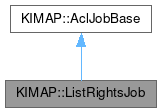KIMAP::ListRightsJob
#include <listrightsjob.h>

Public Member Functions | |
| ListRightsJob (Session *session) | |
| Acl::Rights | defaultRights () |
| QByteArray | identifier () |
| QList< Acl::Rights > | possibleRights () |
| void | setIdentifier (const QByteArray &identifier) |
 Public Member Functions inherited from KIMAP::AclJobBase Public Member Functions inherited from KIMAP::AclJobBase | |
| AclJobBase (Session *session) | |
| QString | mailBox () const |
| void | setMailBox (const QString &mailBox) |
Protected Member Functions | |
| void | doStart () override |
| void | handleResponse (const Response &response) override |
 Protected Member Functions inherited from KIMAP::AclJobBase Protected Member Functions inherited from KIMAP::AclJobBase | |
| AclJobBase (JobPrivate &dd) | |
Additional Inherited Members | |
 Public Types inherited from KIMAP::AclJobBase Public Types inherited from KIMAP::AclJobBase | |
| enum | AclModifier { Add = 0 , Remove , Change } |
Detailed Description
Lists the possible and automatic rights for an identifier on a mailbox.
This job can only be run when the session is in the authenticated (or selected) state.
The user must have the Acl::Admin permission on the mailbox for this job to succeed (see MyRightsJob).
This job requires that the server supports the ACL capability, defined in RFC 4314.
Definition at line 34 of file listrightsjob.h.
Constructor & Destructor Documentation
◆ ListRightsJob()
|
explicit |
Definition at line 37 of file listrightsjob.cpp.
◆ ~ListRightsJob()
|
override |
Definition at line 42 of file listrightsjob.cpp.
Member Function Documentation
◆ defaultRights()
|
nodiscard |
The rights that will always be assigned to the identifier, regardless of the access control list.
For example, under the UNIX permission model, the owner of a mailbox will always have the Acl::Admin right.
Definition at line 83 of file listrightsjob.cpp.
◆ doStart()
|
overrideprotected |
Definition at line 46 of file listrightsjob.cpp.
◆ handleResponse()
|
overrideprotected |
Definition at line 53 of file listrightsjob.cpp.
◆ identifier()
|
nodiscard |
The identifier that will be looked up.
Definition at line 77 of file listrightsjob.cpp.
◆ possibleRights()
|
nodiscard |
The rights it is possible to assign to the identifier.
The rights are grouped by those that are tied together. For each set of rights in the returned list, either all or none of those rights may be set, but not only some of them.
For example, under the UNIX permission model, the following rights are all controlled by the "write" flag, and hence must either all be set or all be not set:
Definition at line 89 of file listrightsjob.cpp.
◆ setIdentifier()
| void ListRightsJob::setIdentifier | ( | const QByteArray & | identifier | ) |
Sets the identifier that should be looked up.
The meaning of identifiers depends on the server implementation, with the following restrictions:
- "anyone" means any authenticated user, including anonymous
- an identifier starting with a minus sign ('-') indicates "negative rights": rights that should be taken away from matching users
Other than the above restrictions, ACL identifiers are usually IMAP usernames, but could potentially be group names as well.
Note that negative rights override positive rights: if "fred" and "-fred" are both assigned the 'w' right, the user "fred" will not have the 'w' right.
- Parameters
-
identifier the identifier to list the rights for
Definition at line 71 of file listrightsjob.cpp.
The documentation for this class was generated from the following files:
Documentation copyright © 1996-2025 The KDE developers.
Generated on Fri Apr 11 2025 11:50:26 by doxygen 1.13.2 written by Dimitri van Heesch, © 1997-2006
KDE's Doxygen guidelines are available online.